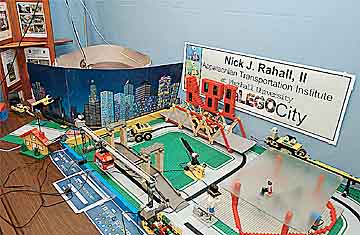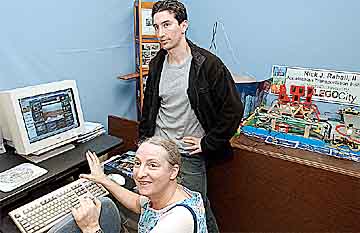sophisticated robotics lab that can be used online by any student in West Virginia. The program
teaches lessons about the Mars rover and other technological feats.
Institute uses Net-based program
to make learning less of a chore

It looks like a playroom, but the LEGOs at the Rahall Appalachian Transportation
Institute make a
sophisticated robotics lab that can be used online by any student in West
Virginia. The program
teaches lessons about the Mars rover and other technological feats.
Institute uses Net-based program
to make learning less of a chore
Chris Stirewalt
Daily Mail Staff

Photo: Chip Ellis
Linda Hamilton and Juan Bueno
Linda Hamilton, project coordinator for the Rahall Appalachian Transportation
Institute’s intelligent
transportation program for children, and staff member Juan Bueno show how
people around the
world have been logging on to operate the same program that runs the Mars
Rovers with Lego-made
replicas at the institute’s Huntington headquarters.
Wednesday February 25, 2004
HUNTINGTON -- If you want to get kids into learning math, science and
computer programming, there's an old teacher's method that works wonders.
You trick them.
That's what the people at the Rahall Appalachian Transportation Institute are doing with a seemingly innocuous roomful of Legos. By the time kids realize that instead of just playing with toys, they've been learning the fundamentals of robotics, they're hooked.
Using an Internet-based program, students in West Virginia and around the world can log on and control a Lego-built city's transportation systems, graphing and examining how things are moving in the colorful, miniature community.
In a timely move, the institute has added Mars to its virtual community. Schoolchildren and adults from around the world have been logging on to steer Lego versions of NASA's Mars rovers, Spirit and Opportunity around a tabletop recreation of the Red Planet.
"Instead of saying that you want them to study math or science, you tell them that you want them to explore and play," said Linda Hamilton, coordinator of the institute's intelligent transportation program for kids. "When they don't see it as a chore, learning can take place faster and with deeper understanding."
Lego has made robotics a big part of its worldwide educational reach, sponsoring design and engineering contests and camps for students far and wide. Hamilton saw a way to take those concepts and apply them to transportation.
What appealed to her most about a Web-based concept was that it would make the learn/play dynamic accessible to children in poorer counties where the Internet has become commonplace but a robotics lab is still far out of reach.
Hamilton travels to schools around the state with a scaled-down version of a Lego city and teaches kids how the process works and how they can join the fun online. Whether using a remote-controlled robot to launch a model rocket in Coalwood or showing Dunbar Elementary students how to make the robotic city come to life, she gets great responses.
"It's easy to reach out and want something big when you're from someplace small," Hamilton said. "That drive is there, and this just gives them a way to start doing big things."
The model Mars rovers have been a big success, too, with thousands of users around the world logging on every day to experience a taste of what NASA engineers are doing with Spirit and Opportunity.
Online visitors get to use the same basic program that the scientists at Jet Propulsion Laboratories use to guide the rovers, and can see a minuscule Martian surface that looks realistic over the Internet.
"People want to know if it's a whole room or how big it is. When they bump up against the background, they wonder if they're hitting the mountains in the distance," Hamilton said. "That's partly the technology, but it's more their imaginations at work. They get carried away."
Writer Chris Stirewalt can be reached at 348-4824.
© Copyright 2004 Charleston Daily Mail -- Privacy
policy -- Send
Web site feedback or a Letter
to the Editor